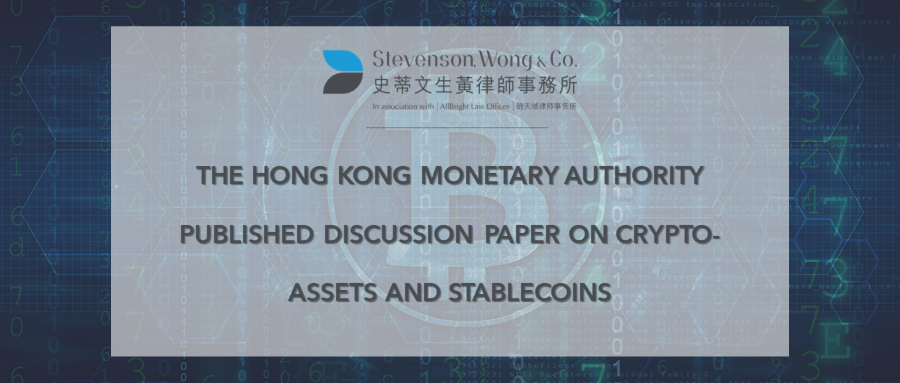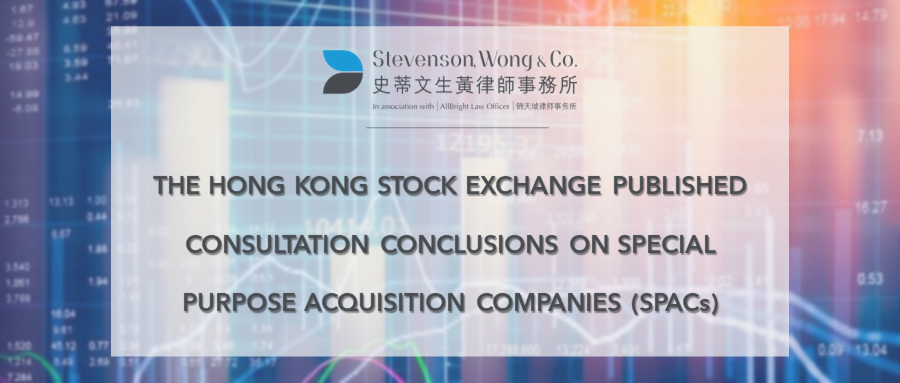Introduction
On 12 January 2022, the Hong Kong Monetary Authority (the “HKMA”) issued a discussion paper on crypto-assets and stablecoins (the “Discussion Paper”), inviting industry and public views on the applicable regulatory approach. Against the backdrop of increasing global adoption of crypto-assets and enhanced use of technology in financial systems, the HKMA has visited the regulatory regimes of Hong Kong as well as other major countries and the recommendations from the global regulators on this nascent field. The two keys of the Discussion Paper are the regulatory frameworks regarding (i) the Authorized Institutions (“AIs”) and (ii) payment-related stablecoins.

Crypto-assets and Stablecoins
In the Discussion Paper, the definition and nature of crypto-asset and stablecoins are broadly set out as follows:
|
Definition and Nature |
|
|
Crypto-asset |
Stablecoins |
|
|
Current Regulatory Regime in Hong Kong
A. Proposed licensing regime for virtual asset service providers (“VASP regime”)
In November 2019, the Securities and Futures Commission (the “SFC”) issued a position paper to set out a licensing framework for platforms which offer trading of securities-type VAs or tokens (“voluntary opt-in regime”). In particular, the voluntary opt-in regime is applicable to only platforms that offer trading services of at least one virtual asset (“VA”) with securities features involved. Platforms solely trading non-securities VAs are not covered.
In May 2021, Financial Services and the Treasury Bureau (“FSTB”) has completed the public consultation on introducing the VASP licence regime targeting at business operating a virtual asset (“VA”) exchange. At the initial stage, the licence regime will not apply to other types of VASPs such as crypto wallet providers or custodians. For further details, please refer to our news update “FSTB Consultation Conclusions on Legislative Proposals to Enhance Anti-Money Launder and Counter-Terrorist Financing Regulation in Hong Kong on Virtual Asset Services Providers” published on 9 July 2021.

B. Payment Systems and Stored Value Facilities Ordinance (“PSSVFO”)
Under the PSSVFO, the HKMA licenses and supervises Stored Value Facilities (“SVFs”), such as e-wallets and prepaid cards. The arrangements of crypto-assets, especially those used for payment purposes, are in some aspects similar to an SVF. Yet, whether a crypto-asset business amounts to an SVF is determined case by case. If a crypto-asset falls within the definition of SVF, it will be subject to a mandatory licensing regime administered by the HKMA. However, the definition of SVF of the PSSVFO may not cover certain types of stablecoins and/or their activities as may be seen in the market. Therefore, the HKMA is considering expanding the scope of the PSSVFO to cover such payment-related stablecoins.
C. Non-backed crypto-assets such as security crypto-assets
In November 2018, the SFC issued a circular to all intermediaries regarding regulatory requirements and expected standards and practices concerning the distribution of VA funds. For VA funds not authorised by the SFC, intermediaries should only target clients who are professional investors (as defined under the Securities and Futures Ordinance). The AIs intending to provide investment services related to VA must notify the HKMA and the SFC in advance.
Payment-related Stablecoins
Some stablecoins may become a commonly accepted means to make payment which may fall outside existing regulatory frameworks, posing risks to the market and community. One of the key risks is the money laundering/terrorist financing (ML/TF) risk as stablecoins may be held and changed hands anonymously and easily (even across the globe and borders) through the internet or other means.

Key Discussion Questions
A list of eight questions set out by the HKMA for industry and public feedback, together with its corresponding views, are extracted as follows:
|
No. |
Discussion Question |
Views of the HKMA |
|
|
Types of Stablecoins To Be Regulated |
|
|
1. |
Should we regulate activities relating to all types of stablecoins or give priority to those payment-related stablecoins that pose higher risks to the monetary and financial systems while providing flexibility in the regime to make adjustments to the scope of stablecoins that may be subject to regulation as needed in the future? |
|
|
|
Stablecoin-related Activities |
|
|
2. |
What types of stablecoin-related activities should fall under the regulatory ambit, e.g. issuance and redemption, custody and administration, reserves management? |
|
|
|
Authorisation and Regulatory Requirements |
|
|
3. |
What kind of authorisation and regulatory requirements would be envisaged for those entities subject to the new licensing regime? |
|
|
|
Intended Coverage of the Regime |
|
|
4. |
What is the intended coverage as to who needs a license under the intended regulatory regime? |
|
|
|
Timing of the New Regime |
|
|
5. |
When will this new, risk-based regime on stablecoins be established, and would there be regulatory overlap with other financial regulatory regimes in Hong Kong, including but not limited to the SFC’s VASP regime, and the SVF licensing regime of the PSSVFO? |
|
|
|
Stablecoin Issuer |
|
|
6. |
Stablecoins could be subject to run and become potential substitutes of bank deposits. Should the HKMA require stablecoin issuers to be AIs under the Banking Ordinance, similar to therecommendations in the Report on Stablecoins issued by the US President’s Working Group on Financial Markets? |
|
|
|
Unbacked Crypto-assets |
|
|
7. |
Would the HKMA also have plan to regulate unbacked crypto-assets given their growing linkage with the mainstream financial system and risk to financial stability? |
|
|
|
Current or Prospective Parties |
|
|
8. |
For current or prospective parties and entities in the stablecoins ecosystem, what should they do before the HKMA’s regulatory regime is introduced? |
|

Analysis and Takeaways
The fast-growing use of crypto-assets may pose risks to the financial system. Developing regulatory perimeters to appropriately govern crypto-assets could address the various risks posed to users and the financial system while embracing the potential benefit of innovations in the market. The Discussion Paper is a timely step taken by the HKMA to update its regulatory tools and shows the initiative and determination of the regulators in Hong Kong to ensure monetary and financial stability amidst technological advancement. We welcome more discussions and sparkles on this topic.
Please contact our Partner Mr. Rodney Teoh for any enquiries or further information.
This news update is for information purposes only. Its content does not constitute legal advice and should not be treated as such. Stevenson, Wong & Co. will not be liable to you in respect of any special, indirect or consequential loss or damage arising from or in connection with any decision made, action or inaction taken in reliance on the information set out herein.










